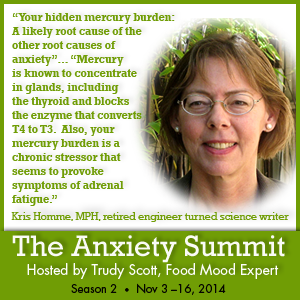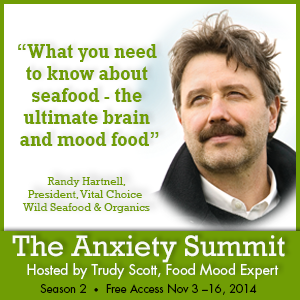
Seafood is a great source of amino acids, omega-3 fatty acids, zinc, iodine, iron, calcium, selenium, and vitamins B12, A, and D, many of which are beneficial for mood disorders.
Fish in the diet has a positive impact on depression
A number of studies have found that including fish in the diet has a positive impact on depression, especially those that refer to traditional diets (the famous one is by Jacka and colleagues) and the Mediterranean diet (there are a number of studies by Sanchez-Villegas et al). A study from Finland found that the prevalence of depression was lower in countries where consumption of seafood is high.
When it comes to diet and nutrients there is much more research on depression than anxiety, so when my book The Antianxiety Food Solution was published in 2011, I wrote the following:
Given the link between anxiety and depression, it’s possible that seafood consumption could also help reduce the incidence of anxiety.
A study that now shows reduced anxiety with fish consumption
We have a study that now shows this: Reduced anxiety in forensic inpatients after a long-term intervention with Atlantic salmon
In the study, 95 male forensic patients were randomly assigned to one of two groups:
- a Fish group where they consumed Atlantic salmon three times per week from September to February OR
- a Control group where they consumed other protein sources such as chicken, pork, or beef three times per week, also from September to February
The paper lists the incidence of the following disorders amongst the study participants (all sexual offenders) who were in a secure forensic inpatient facility in the USA:
Personality disorders (antisocial personality disorder, borderline personality disorder or personality disorder with antisocial traits) were diagnosed among 76% of the participants. Moreover, about 31% of the participants were diagnosed with some kind of anxiety disorder (GAD, OCD, PD or post-traumatic stress disorder) and about 18% were diagnosed with depression (major depressive disorder or depressive disorder). About 31% of the participants had both a personality disorder and an anxiety or depressive disorder.
The study findings
The study participants consumed salmon for 6 months and the study findings suggest that
Atlantic salmon consumption may have an impact on mental health related variables such as underlying mechanisms playing a key role in emotion-regulation and state-anxiety
And that
The present results showed that fatty fish consumption caused changes in HRV [heart rate variability] which is regarded as an essential underlying biological mechanism involved in anxiety and emotion-regulation.
A few interesting factors about this study
- The salmon was farmed and mercury and dioxin levels were measured. Despite this, mental health benefits and reduced anxiety was observed. I suspect even more favorable results would have been observed had wild salmon been used
- The authors mention that a longer intervention as in this study i.e. 23 weeks/6 months is likely to lead to better results than a shorter intervention
- The Fish group had a significant increase in both omega-3 fatty acids: EPA and DHA
- The authors speculate about how improved vitamin D status in the Fish group may help regulate serotonin production and thereby help regulate heart rate variability and reduce anxiety
- The study highlights nutritional benefits of fatty fish other than marine omega-3 fatty acids and vitamin D: selenium, iodine, vitamin B12 and high quality proteins. I’d like to add that it is a source of zinc and iron too, both of which are co-factors for making brain chemicals.
- Although the study found a significant decrease in state-anxiety, it did not find any changes in trait-anxiety (here are the differences in state-anxiety and trait-anxiety). The authors suggest that trait-anxiety may be more difficult to change during a 6-month intervention study. I’d like to add that other concurrent nutritional and biochemical interventions would likely have provided additional mental health benefits. This could include: a gluten-free diet, targeted individual amino acids, addressing dysbiosis, addressing high or low histamine, pyroluria and zinc-copper imbalances and so on.
The authors mention a limitation of the study, in that this group of adult male forensic inpatients may make it difficult to generalize the results to other groups in the population and recommend further similar research in children and women.
I look forward to future research but I feel very comfortable about putting this limitation aside for now, especially with the positive results found with this group of patients with very severe symptoms.
I also feel very comfortable extrapolating these results from salmon to sardines and would expect similar beneficial results. I highly recommend selecting wild salmon or wild sardines rather than farmed.
If you suffer from anxiety and stress, or any mood disorder, I hope this research is further motivation to eat wild fatty fish a few times a week. How much fatty fish do you eat each week and have you observed mood or other health improvements?
And if you’re a practitioner, I hope this research is a bigger incentive to continue to recommend fatty fish to your clients or patients.
If you’re looking for some great recipes check out this yummy summer salmon pate recipe and this delicious pomegranate olive mint salsa to serve on grilled salmon. Vital Choice, a wonderful source for great quality home delivery WILD fish, has great recipes on their site too.

